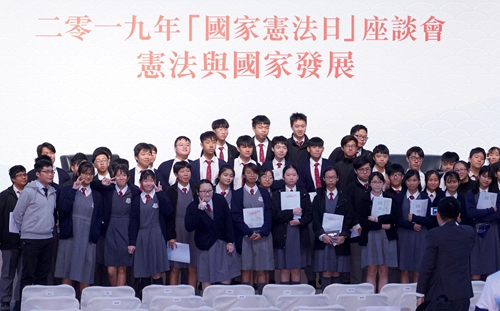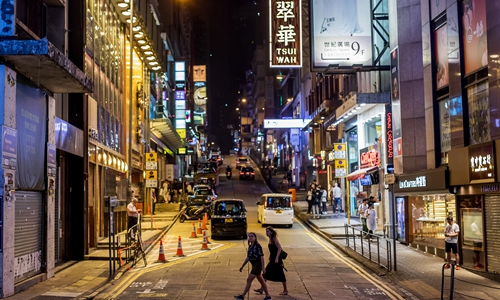HOME >> CHINA
Lam: HK must strengthen education on Constitution
By Yang Sheng Source:Global Times Published: 2019/12/4 23:03:41 Last Updated: 2019/12/5 17:50:11

Students pose for photos after attending a National Constitution Day symposium at the Hong Kong Convention and Exhibition Centre on Wednesday, which is also China's sixth national Constitution Day. Professors from the mainland and HK universities, members from the Standing Committee of the National People's Congress were invited to speak. Photo: VCG
Hong Kong people, especially civil servants, need to strengthen their national awareness and identity, and education on the Chinese Constitution and the Basic Law, Chinese officials and experts said Wednesday at a forum in Hong Kong to commemorate national Constitution Day, and they also said national security legislation in the city is necessary since the foreign forces continually interfere in Hong Kong affairs in the months-long turmoil.
Chief Executive Carrie Lam of the Hong Kong Special Administrative Region (HKSAR), Wang Zhimin, director of the central government's liaison office in Hong Kong, and Shen Chunyao, director of the Legislative Affairs Commission of the National People's Congress Standing Committee, spoke at a seminar on Wednesday attended by about 700 people including the city's top officials, politicians, educators and about 300 secondary school students, the Xinhua News Agency reported.
Lam said "the Constitution and the Basic Law form the constitutional foundation of the SAR government. We must strengthen education of these."
The Hong Kong government should strengthen education on the Constitution and the Basic Law to promote the national identity and awareness among different groups of Hong Kong society, especially among civil servants and the youth, she noted.
Kennedy Wong Ying-ho, a solicitor of the Supreme Court of Hong Kong, told the Global Times on Wednesday that the government is the key to realizing this goal.
"The HKSAR government didn't establish an evaluation system to test the knowledge and understanding on the Constitution and Basic Law for civil servants, educators, social workers and medical workers. There are only some study sessions which are totally not enough," Wong said.
Chinese observers noted that after 1997, Hong Kong civil servants have gained huge power in city governance, but most had not studied enough of the Constitution, Basic Law and the "one country, two systems" principle, and that's why some of them have some misunderstanding and made mistakes implementing the law.
The government should set up an examination system on the Constitution, Basic Law and "one country, two systems" for civil servants, Wong said. "The officials can get promotion only after they pass the exam," he said.
It was not easy but the government should have the determination and courage to do the right thing, Wong noted.
"In the past, the government was too weak to insist correct policies and make compromise easily while facing with disagreements. Today's situation is the consequence."

Pedestrians cross a road in the Central district of Hong Kong in October. Photo: VCG
Article 23
Wang, director of the central government liaison office said at the forum that "in the past few months, extreme violent criminal activities that frequently happened in Hong Kong have seriously violated the rule of law and public order…and in essence, these activities are trying to challenge and undermine the 'one country, two systems' principle set by the Constitution and the Basic Law."
Forum attendee Ip Kwok-him, an unofficial member of the government executive council and a Hong Kong delegate to the National People's Congress in Beijing, said that in the months-long turmoil, the interference and interruptions by foreign forces were "very clear and this has already threatened the national security and public order in the city."
A national security law, Article 23 of the Basic Law was an actual requirement, Ip said.
Ip said he hoped the government seriously and actively consider pushing the legislation forward and explain the necessity of the legislation to the citizens rather than "sit and wait the chance to come."
Li Xiaobing, an expert on Hong Kong, Macao and Taiwan studies at Nankai University in Tianjin, said that in short term, considering the political situation and environment in Hong Kong, the legislation for Article 23 was not easy, but the government could still use multiple measures to safeguard national security.
"As the Ministry of Foreign Affairs announced sanctions against five US-based NGOs which played a role in radical protest in Hong Kong and the HKSAR government said it will follow and cooperate as this is the decision on diplomatic matter made by the central government, this means the HKSAR government can make contribution to safeguard national security even without the legislation of Article 23," Li said.
The government hasn't made full use of the common law system in Hong Kong to deal with foreign interference yet, said Li.
"As long as law-enforcement and the judicial organs in Hong Kong strictly implement the current law such as the Public Order Ordinance, they can effectively contain the activities that threaten national security in the city."
If Hong Kong judicial organs made judgments rulings against national security, Lau Siu-kai, the vice-president of the Chinese Association of Hong Kong and Macao Studies said that "then the interpretation of the Basic Law by the Standing Committee of National People's Congress would become more normalized, to make sure that the 'one country, two systems' principle is carried out in an accurate and comprehensive way."
RELATED ARTICLES:
Posted in: HK/MACAO/TAIWAN